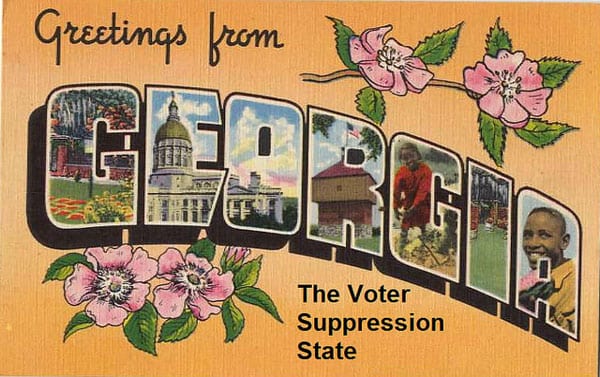
February 20, 2019; The Root
Voter suppression took center stage in Georgia’s 2018 midterm election. As now-Governor Brian Kemp and former House Minority leader Stacey Abrams competed for the highest seat in the state, the issue drew nationwide focus. It’s three months after the election, and the examination of voter suppression continues—this time, with Congress at hand.
The elections subcommittee, led by Rep. Marcia Fudge, took a trip to Georgia last week. There, they found “a stack of interwoven intentional efforts” by Governor Kemp, also Georgia’s former Secretary of State, “to disenfranchise black voters.”
Testifying before the committee were Abrams; Sean J. Young, the legal director for Georgia ACLU; Cliff Albright, co-founder of Black Voters Matter; Gilda Daniels, director of litigation for the Advancement Project; and a Georgia voter, Stacey Hopkins.
Abrams, a longtime advocate for voting rights and the founder of the nonprofit Fair Fight Action, a political action committee that will “pursue accountability in Georgia’s elections and integrity in the process of maintaining our voting rolls,” provided a list of “disturbing” details:
Sign up for our free newsletters
Subscribe to NPQ's newsletters to have our top stories delivered directly to your inbox.
By signing up, you agree to our privacy policy and terms of use, and to receive messages from NPQ and our partners.
- Voters, many of whom were first-time voters, experienced numerous issues with being located on the voting rolls receiving and returning absentee ballots and were given a disturbing number of provisional ballots, rather than being allowed to vote unhindered.
- In some areas, the election officials refused to provide provisional ballots, citing a shortage of paper in counties polling locations [which] ran out of provisional ballots and backup paper ballots. Frustrated voters received inaccurate information regarding their rights, and thousands of voters were forced to vote using provisional ballots due to long lines. An untold number simply gave up, unable to bear the financial cost of waiting in line, because Georgia does not guarantee paid time off to vote.
- Across the state, voters faced obstacles that shook their confidence in the electoral process, leading to more than 50,000 calls to a local voter protection hotline in a 10-day period immediately following the election. From issues with registration, to ballot access, to the counting of votes, Georgians faced systemic breakdown in its electoral process.
When Abrams was questioned regarding the historic undervote in Georgia, where 127,000 votes disappeared into thin air, she answered, “The reasons for that could be numerous. The challenges to that…is that there is no way to find out the answer because Georgia has machines that do not provide an audit trail.” As NPQ has reported, Georgia has never had a secure voting system. Robert DeMillo, one of the most respected elections systems experts, has stated “that unauditable systems such as Georgia’s pose a very real threat to voting security.”
Hopkins said that when she moved within her voting district, she and three of her adult children were to be “classified as inactive voters and designated to be purged off of the voting rolls using a method known as the ‘postcard trick.’” Her voter registration and those of her children were part of the 1.4 million Georgia voters Kemp targeted, receiving a postcard in the mail suggesting they were in some sense ineligible to vote. Luckily, Hopkins and her children had already voted, but the question remains as to why the notice was sent—by law, all that was required of her was to notify the US Postal Service of her address change.
As Civil Rights hero Rep. John Lewis summed up the hearing, “There are forces in our region trying to take us back to another time and another period and you are bearing witness. But we must not go back.”
While the governor’s race may be over, make no mistake—the fight for a fair and just voting system continues.—Diandria Barber













